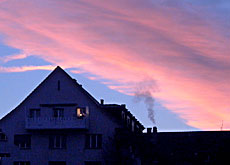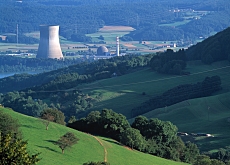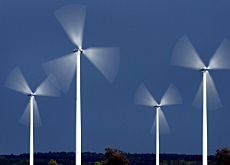New proposal aims to slash CO2 gases

Environmental groups and centre-left political parties have launched a proposal aimed at reducing greenhouse gas emissions within just over a decade.
Supporters said they wanted to prevent the construction of new gas power plants by promoting better energy efficiency and the use of more renewable energy resources.
By 2020, carbon dioxide emissions must be cut to levels which are 30 per cent below those in 1990, according to the initiative committee.
The groups, including World Wildlife Fund (WWF), Greenpeace, as well as the Social Democratic and the Green parties, now have 18 months to collect the necessary signatures for a nationwide vote on the issue.
“Switzerland’s energy policy urgently needs a change in direction to avoid a climate disaster and the dangers of nuclear energy,” said Kaspar Schuler of Greenpeace Switzerland on Monday.
The target of a 30 per cent reduction is realistic, according to Thomas Vellacott of the WWF. He added that the European Union has similar goals, provided industrialised countries from outside Europe join in as well.
Last week European Union leaders agreed to slash carbon dioxide emissions by 20 per cent from 1990 levels by the year 2020 and to adopt a binding target on the use of renewable energy.
“Citizens wants to see concrete measures, not just hot air produced by politicians,” Vellacott said.
Pressure on parliament
Ursula Wyss, a parliamentarian for the Social Democratic Party, says the technology to use energy more efficiently has been available for a long time.
Ruth Genner of the Green Party blames centre-right and the rightwing parties for blocking previous attempts to introduce stringent measures to protect the environment.
However, the centre-right Radical Party has dismissed the proposal as interference in citizens’ personal freedom.
The people’s initiative comes as parliament is debating a series of legal measures, including the details of a planned tax on greenhouse gas emissions on fuel and gas power plants.
Last month cabinet outlined its energy policy in a bid to prevent a predicted power shortfall within the next few decades.
The government seeks to boost energy-saving measures and renewable energy but has also come out in favour of building new nuclear power plants.
swissinfo with agencies

More
People’s initiative
Switzerland has pledged a 10% reduction in CO2 levels by 2010.
The Swiss CO2 law formally took effect in 2000 and foresees additional measures if targets cannot be met by voluntary means.
Last year, parliament agreed in principle to a staggered introduction of a levy on heating oil and gas.
But there is no mandatory CO2 tax on petrol and diesel emissions after the industry decided to introduce a levy on petrol and diesel, known as the climate centime.
Energy consumption 2005, according to Federal Energy Office:
Fuels 31.1%
Heating oil 25.4%
Electricity 23.2%
Gas 12.2%
Other energy sources (Coal, wood, etc) 7.2%
Other renewable energy sources (Sun, wind, etc.) 0.9%

In compliance with the JTI standards
More: SWI swissinfo.ch certified by the Journalism Trust Initiative


You can find an overview of ongoing debates with our journalists here. Please join us!
If you want to start a conversation about a topic raised in this article or want to report factual errors, email us at english@swissinfo.ch.